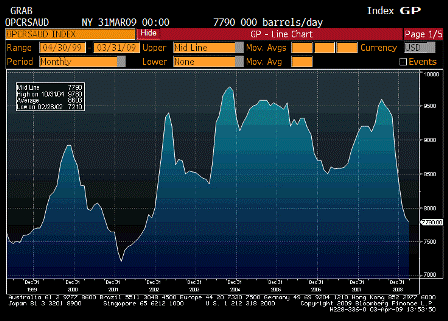Right, as swing producer/monopolist that’s what they necessarily do- set price and let quantity adjust.
But if quantity demanded exceeds their ability to pump they lose control of price on the upside.
>
> (email exchange)
>
> On Thu, Feb 24, 2011 at 9:43 AM, Greg wrote:
>
> Just like you say about the Saudi’s…..
>
Saudi Arabia in talks to boost oil output
By David Blair, Jack Farchy and Javier Blas
February 24 (FT) — Saudi Arabia is in “active talks” with European oil companies to meet the production shortfall left by Libya, the clearest indication to date that the leader of the Opec oil cartel is about to boost supplies to stop further rises in the oil price, which surged to near $120 a barrel on Thursday.
Riyadh is asking “what quantity and what quality of oil they [the European refiners] want,” a senior Saudi oil official said on condition of anonymity.
Oil traders said the talks signalled that Saudi Arabia realised that the political crisis in Libya was now an oil supply crisis and that the kingdom needed to act quickly and decisively to stop oil prices hurting the global economic recovery.
“You can only expect the price to go up. It is fear of the unknown. The risks are all to the upside,” one senior oil trader said. “Saudi Arabia needs to respond.”
The kingdom is considering two options for increasing supplies. The first would be to boost Saudi production and send more crude through the kingdom’s East-West pipeline, which links the Gulf region with the Red Sea port of Yanbu, for shipment to Europe.
Another possibility, which is currently only being “studied”, would be a swap arrangement, whereby West African oil intended for Asian buyers is redirected to Europe, with Saudi Arabia stepping in to supply the Asian customers.
West African oil, such as Nigerian crude, is very similar to the gasoline-rich Libyan oil, traders said, noting that West Africa is geographically closer to Europe than Saudi Arabia.
“Right now, there are active talks in order to implement what is needed,” the Saudi oil official added. He stressed that the kingdom retained spare capacity of some 4m barrels a day – more than than double Libya’s entire output which totalled 1.58m b/d in January, according to the International Energy Agency.
Saudi Arabia has not yet decided whether to increase its output in response to Libya’s crisis, the official added, saying it would depend on the requirements of European oil companies.
If it proved necessary for Saudi Arabia to produce more, “then that will happen, there’s no problem at all”, he added.
Traders believe Saudi Arabia has the capacity to boost production by at least 1m b/d with just 24 hours notice, meaning that if a decision was adopted now, the oil tankers could be arriving in Europe within 10 days.
The move by the world’s largest oil producer comes as Eni of Italy, the most active foreign oil company in Libya, said on Thursday that oil production from the North African country has plunged to just a quarter of normal levels.
Increasingly panicked buying drove the price of Brent crude futures, the global pricing benchmark, up 6.7 per cent to a peak of $119.79, the highest since August 2008. Traders and investors feared that the near-total shutdown of Libya’s oil industry would leave the global oil market with little supply cushion should the political crisis spread to another major Middle Eastern oil producer.
Paolo Scaroni, Eni chief executive, on Wednesday made the most pessimistic public assessment to date of the impact of the Libyan crisis on the country’s oil output, saying the country was producing only 400,000 b/d, compared with 1.6m b/d before the violence erupted.
“The real phenomenon is there are 1.2m barrels less on the market,” Mr Scaroni told reporters in Rome, adding that the loss of Libyan production was “not a huge thing, but it is something and there is also a sense of general uncertainty in the region which can be the trigger for speculation”.
The shortfall means the world market is enduring its biggest oil crisis since hurricane Katrina in 2005 knocked out most US oil production in Gulf of Mexico.
Traders believe that Saudi Arabia has the capacity to increase production and also the oil of the right quality to meet the shortfall. The kingdom produces so-called Arab Extra Light and Arab Super Light, which through blending could be made to resemble the high-quality, light, sweet oil produced by Libya.
The Saudi move comes as oil prices reached levels that many economists believe will dramatically slow the global economy and potentially trigger a double-dip recession. Oil prices hit an all-time high of nearly $150 a barrel in mid-2008.


